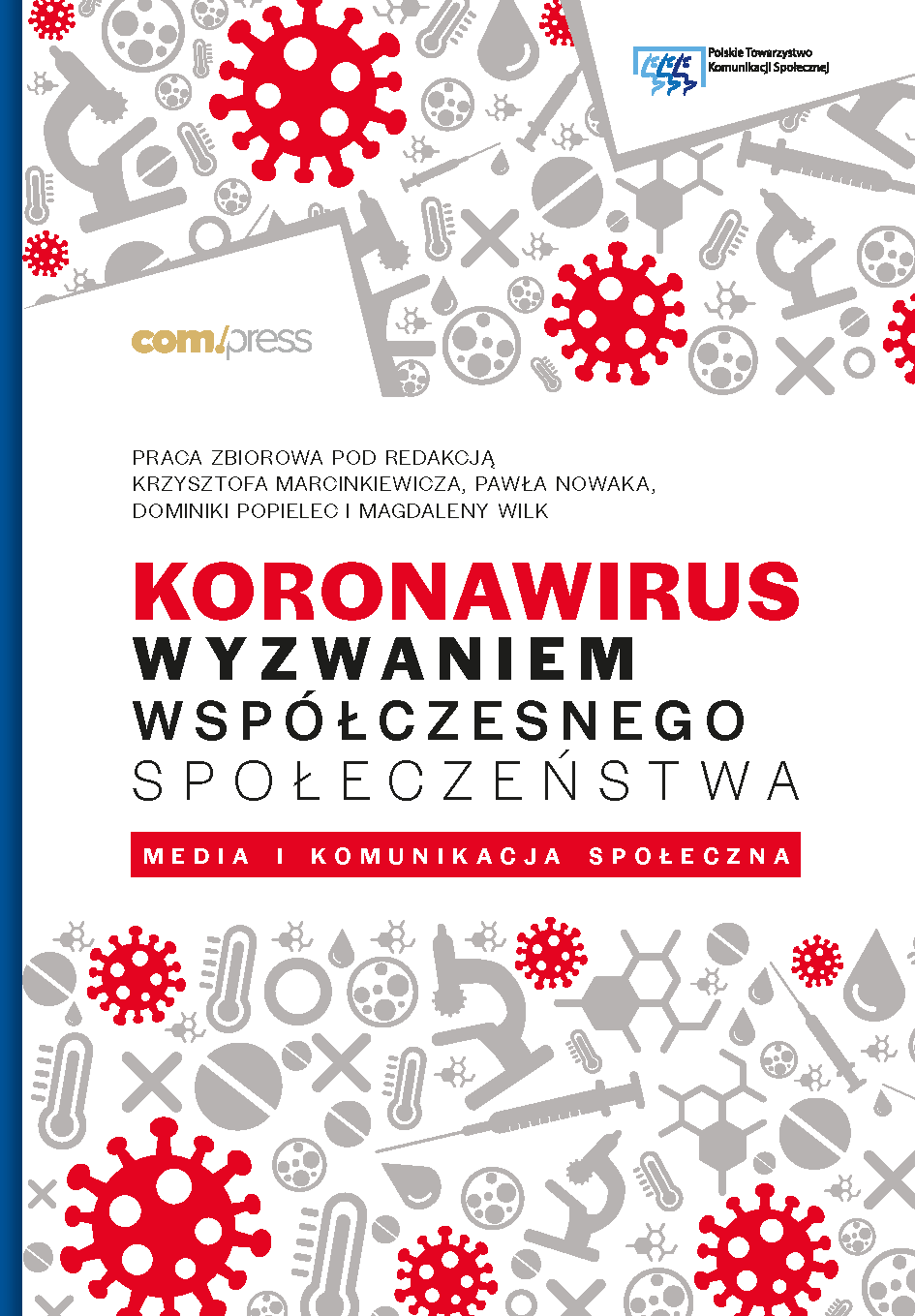Introduction
The first quarter of 2020 has dramatically changed the world we had known so far. On 4th March 2020, the first case of SARS-CoV-2 infection was recorded in Poland. A week later, the Director-General of the World Health Organization, Tedros Adhanom Ghebreyesus, declared the COVID-19 epidemic, caused by the Wuhan virus, a pandemic. Among many restrictions, introduced also in Poland, there were some which changed our daily functioning. The coronavirus has become a challenge for the modern society and the pandemic has affected almost every aspect of our lives. The pandemic and the changes it causes in the life of the global community make an interesting research subject for young scientists, especially for new media and social communication researchers. Indeed, it is necessary to pay particular attention to the way the media and the whole society function.
This publication is the result of studies and analyses done by representatives of many scientific communities from all over Poland. It focuses on many issues concerning public relations strategies, functioning of civil society institutions, grassroots movements, and broadly understood communication which significantly changed due to the pandemic. The monograph is divided into two parts. The first one is devoted to political phenomena, society, and media coverage. In the second, the Reader can find articles and studies concerning institutions, grassroots movements, and communication strategies.
The publication begins with an article by Dominika Popielec in which she analyzes examples of journalistic investigations regarding information related to the coronavirus. The author presents cases confirming that investigative journalism remains an important mechanism for controlling those in power, no matter the circumstances. Denis Halagiera investigates the interactions of Facebook users with fake news related to COVID-19. He pays particular attention to the reactions of users to one of the methods of fighting with fake news introduced by the administrators. Leszek Świeca addresses the topic of medical Machiavellianism basing on the example of media disinformation in Poland regarding masks protecting against coronavirus. In his case study, he shows the differences of views on this topic, leading to chaos and a social dispute over the effectiveness of the masks as protection against the Wuhan virus. The difficulties related to distance education with the use of the media and electronic services during the pandemic are discussed by Paweł Nowak. Using three different research methods, he identifies problems that affected the "Szkoła z TVP" project and presents recommendations for solving them. Then, Stanisław Michałowski investigates Internet comics during the epidemic. The author analyzed 116 comics focusing on the topics discussed by their authors and their purposes. The impact of the pandemic on the law and electoral practice is discussed by Jakub Kocjan. In his article, he describes the cases of Poland, the United States, and Bavaria. Krzysztof Marcinkiewicz discusses the condition of digital competences in remote education. The author analyzes the activities of the Polish government and other entities, examining the indicators of the development of the information society during the pandemic. The first part of the publication ends with an article by Dorota Stępowska in which she focuses on issues related to the spread of disinformation in the digital space, the epidemiological threat, the opportunities of the global network, and the increase in media consumption. The author presents ways of using the Internet as a tool for generating information and a mechanism supporting various types of institutions.
The second part of the publication begins with the article by Agnieszka Kamińska in which she deals with the issue of women's protests during the pandemic. The author analyzes the activity of the non-profit organizations that support the protests against the draft law on changing the conditions for termination of pregnancy, which was discussed in April 2020. Monika Borzdyńska describes the communication activities of PGE Narodowy during the COVID-19 epidemic. In her article, she analyzes and evaluates the brand's activity. The situation of non-governmental organizations in this difficult period is presented by Magdalena Wilk. The author also analyzes the support provided to the third sector by various entities and the aid measures targeted at particular social groups. Social initiatives of Internet users in Poland inspired Radosław Komuda, Krzysztof Rajd, and Jakub Szczepkowski to investigate these activities during the pandemic, opening up new research perspectives. Then, Justyna Białous discusses new conflicts at the global level. The author presents the problem of the responsibility of international organizations, discussing the case of the disagreement between the USA and the WHO. The publication ends with an article by Milena Le Viet-Błaszczyk in which she investigates how Polish companies communicate with potential customers via social media during the epidemic. The author conducted research aimed at identifying a catalog of good social media marketing practices in the times of COVID-19.
We believe that a wide range of topics approached by the authors, with the coronavirus pandemic as a common ground, will be interesting for the Readers. At the same time, we hope that the proposed analyses and new research directions will become an inspiration in these exceptional times. The presented articles clearly show that remote research activity is not only possible but also gives an interesting perspective. As young scientists, we are glad to offer you this publication and at the same time, open a discussion on new insights, research directions, and phenomena related to the pandemic.
Kraków, July 2020

Edited by
Krzysztof Marcinkiewicz,
Paweł Nowak,
Dominika Popielec,
Magdalena Wilk
eISBN: 978-83-956040-4-1
Keywords: coronavirus, media, social communication, COVID-19


